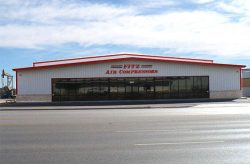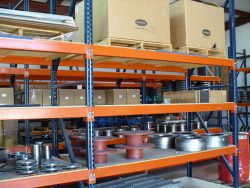What is an Offshore Air Compressor and How Does It Work?
Industrial air compressors are vital for a company in the oil and gas industry. In particular, offshore oil facilities demand reliable air compression solutions to sustain operations across all facets.
Offshore air compressors are capable of providing the performance they need. The compact and robust design of these devices allows offshore oil facilities’ technical and capacity requirements, where space is in short supply, to meet their demands.
To explore more about our robust and efficient offshore air compressors tailored for the oil and gas industry, visit our Contact Us page or call us at 888-220-3489.
Learn more about offshore air compressors below as we delve into what they are, what they do, and how they are commonly used in offshore oil drilling operations.
What is an Offshore Air Compressor?
An air compressor is a pneumatic device that pressurizes air as it forces air molecules inside storage devices (typically cylindrical tanks). As the tank fills up with more air, its pressure increases until it reaches its engineered full capacity. The compressed air, filled with potential energy, is stored within the tank until it is released and converted into kinetic energy to fuel its intended application.
In the oil and gas industry, an offshore air compressor is designed to provide the same air compression capabilities while being able to withstand the harshest conditions on offshore drilling facilities.
How Do Offshore Air Compressors Work?
The function of offshore gas compressors is to pressurize air or other gasses to reduce their volume until the desired delivery point is reached. At this point, the gas moves through a piping system designed for transport toward various predestined points in the extraction process, such as a preprocessing or storage area. Meanwhile, the offshore air compressor must maintain specific pressure levels to keep the gas at the same volume.
Aside from air, an offshore air compressor can also move liquids, making it ideal for most applications in the oil and gas industry. For instance, gas can be introduced at high pressures inside pipelines to move liquids during oil extraction. Within these applications, liquid can be moved in large amounts from the source directly to the collection and production site. After processing, the oil can then be transported directly to the point of purchase using the same system.
What Types of Compressors are Commonly Used Offshore?
Reciprocating and Centrifugal compressors are two of the most popular compressor types used in offshore applications today. Both have become more popular, particularly in offshore crude oil and natural gas operations, for their unique qualities and gas compression capabilities.
Learn more about them below:
- Reciprocating Compressors: In this type of compressor, gasses pass through a suction manifold into a compression cylinder. Gas compression is then carried out using a crankshaft through a reciprocating motion.
- Centrifugal Compressors: A rotating disk, known as an impeller, rotates continuously to increase the velocity of the gas inside the centrifugal compressor. The gas then moves to the divergent duct section, where it is converted to pressure energy. Use cases for centrifugal compressors include the stationary transportation of natural gas within a gas distribution system and compressing gas for storage.
What are Some Offshore Applications of Air Compressors?
The following are some of the most common applications of air compressors in offshore oil and gas operations:
Drilling
Air compressors are popularly used in offshore drilling operations because they supply the much-needed pneumatic energy for powering offshore drills. Greater forces are necessary for these applications because of the harsher conditions that drillers have to face to penetrate the earth’s surface. This is because, unlike onshore drilling operations where holes are drilled on the ground, offshore drilling is performed thousands of feet underwater on the seabed.
Gas Compression
Gas compression is a critical process, especially in natural gas operations. Gas pressurization is required to move natural gas across the pipeline from the wellhead to treatment and processing and then again to transportation and storage.
Gas Lifting
As mentioned above, an offshore air compressor can also move liquids across the pipeline. This process is called gas lifting, where highly compressed air is inserted into the liquid to reduce its density and make it rise to the top of the well. This helps move crude oil from the extraction point to the rig and other similar applications.
Well Testing
Well tests are primary sources of critical data used in determining whether extraction is possible in formations at a rate that provides a reasonable return on investment. With the help of offshore air compressors, test data extracted from well testing is used to determine the limits of a given reservoir to aid in planning the most efficient methods of producing wells and fields. These tests are conducted throughout various stages of the life of gas and oil wells.
Robust Solutions For the Most Demanding Applications
As a leading provider of industrial equipment for clients in various industries, Fitz Equipment is committed to delivering unmatched air compression solutions that match even the most demanding applications. We offer industrial solutions for the oil and gas industry that perform reliably under unfavorable environmental conditions. Get in touch with the experts at Fitz Equipment today to learn more or for immediate assistance, call us at 888-220-3489.




